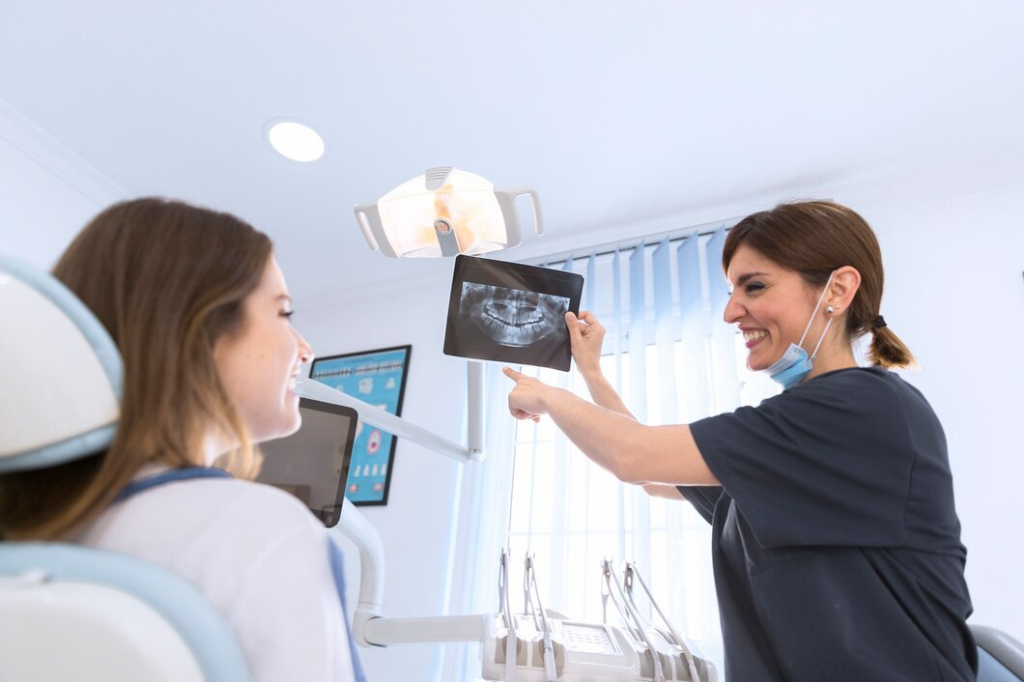Seven Crucial Dental Care Tips For Pregnant Women

Women become more susceptible to cavities and periodontal diseases during pregnancy. Poor oral hygiene habits at this time can result in damaging outcomes for the mother and baby.
Considering dental health as an essential component of care during pregnancy is crucial. Improving pregnant women’s dental health is one approach to preventing the development of cavities in early childhood.
During pregnancy, you must take care of your dental health and hygiene. Hormonal changes brought on by pregnancy increase the chance of gum disease. These changes may impact the health of your unborn child too. Before planning pregnancy, try to schedule a dentist appointment. It will allow for a thorough examination of your gum tissues, teeth cleaning, and the early treatment of oral health issues.

Dental care during pregnancy
Hormonal changes during pregnancy can increase the risk of developing dental problems, such as gum disease and cavities. The risk of premature birth and low birth weight highly occurs due to gum disease. It may have negative consequences on the baby’s health. Additionally, poor oral health may cause gestational diabetes and preeclampsia, both of which can negatively influence pregnancy.
Here are some dental care tips for pregnant women to follow:

1. Schedule a dental appointment: Women should schedule a dental appointment during their first trimester to ensure their teeth and gums are healthy. It’s essential to inform the dentist of the pregnancy, as they may delay specific treatments until the baby is born.
2. Practice good oral hygiene: Brush your teeth twice and floss once daily to remove plaque and prevent gum diseases. It is also important to use fluoride toothpaste that helps prevent cavities.
3. Eat a healthy diet: A healthy diet rich in calcium, phosphorus, and vitamin D can help keep teeth and bones healthy. Additionally, avoiding sugary and acidic foods and drinks can help prevent tooth decay.

4. Avoid specific dental treatments: It is crucial to avoid dental treatments such as teeth whitening and non-emergency surgeries during pregnancy. If X-rays are necessary, the dentist will take precautions to ensure the baby’s safety.
5. Manage morning sickness: Morning sickness can cause stomach acid to enter the mouth, eroding tooth enamel and increasing the risk of cavities. To manage morning sickness, pregnant women can try eating small, frequent meals, drinking plenty of water, and rinsing with baking soda and water.
6. Use a mouthguard: If you grind your teeth at night, a mouthguard can help protect your teeth from damage. Using a mouthguard is especially important during pregnancy, as grinding your teeth can cause pain and damage to your teeth.
7. Follow your dentist’s recommendations: It is crucial to follow their advice if your dentist recommends a particular treatment or procedure. Your dentist will consider your and your baby’s safety and suggest the best action.
Gum disease and premature birth
Gum disease and premature birth are connected, as demonstrated by at least a few significant research. Several studies have linked gum disease to premature birth, which starts 37 weeks before gestation. It can lead to long-term health problems such as cerebral palsy, developmental delay, and visual impairment.

The most preterm births—at 32 weeks—were experienced by mothers with the most severe periodontal disease. Treating gum disease on time may lower the risk of premature birth.
Pregnancy tumor in the mouth
Pregnancy tumors can occur in the second trimester. A big lump with deep red pinpoint patterns occasionally appears on the inflamed gum tissue. They are close to the upper gum line. It can be uncomfortable, make eating and speaking difficult, and even bleed and crust.
Do not be alarmed by the word “tumor.” These growths cannot spread and are not fatal. An inflammatory response to local irritants results in a pregnancy tumor (such as food particles or plaque). Up to 5% of pregnant women have tumors, and frequently, these women also suffer pregnancy gingivitis.
Pregnancy tumors have several other names: pyogenic granuloma, granuloma of pregnancy, lobular capillary hemangioma, and pregnancy epulides. Most of the time, pregnancy tumors go away on their own after the baby is born. Even when they remove it during pregnancy, it usually recurs. Your dentist or a specialist might decide to remove the tumor if it prevents you from eating. Your practitioners may use a local anesthetic during this process.

Importance of nutrition during pregnancy
Nutrition plays a significant role in maintaining good dental health during pregnancy. A balanced diet rich in vitamins and minerals is essential for developing the baby’s teeth and bones.
Consuming recommended amounts of calcium, vitamin D, and phosphorus is essential, which are critical for developing strong teeth and bones. Calcium is also necessary for muscle and nerve function and for adequately developing the baby’s heart and other organs.
Proper nutrition also helps to prevent dental problems during pregnancy. A diet high in sugar and carbohydrates can lead to tooth decay, which can be detrimental to both the mother and the baby. Sugar provides a food source for bacteria that produce acids, causing tooth enamel erosion and cavities.
Treatment of dental problems during pregnancy
Ensure your dentist knows you’re pregnant if you have a dental issue requiring care. You can postpone therapy until after the delivery of your child, depending on your condition. You can use the following treatments during pregnancy:
- Your dentist can prescribe safe medication for you and the unborn child. If your dentist has prescribed you any medication, ensure you consult your doctor. Don’t take any medicine or antibiotic without discussing it with your prenatal care provider.
- Local anesthesia can reduce or avoids pain. Doctors use this on a particular body area, such as the mouth, before tooth extraction. Use of this medication while pregnant is safe.
You can get dental treatment during pregnancy. Schedule it in the second trimester or even after delivery if it’s an effective treatment.
Conclusion
Dental care problems can cause difficulties during your pregnancy. You can consult experts concerning your and your unborn child’s health.
Your oral health depends on good preventative care and follow-up. You can prevent or treat dental problems by getting dental consultations on time.
Do not hesitate to contact Genuine Dental if you require expert advice. Get the perfect guidance and treatment from the best dentists in the country during and after pregnancy. Book an appointment today.